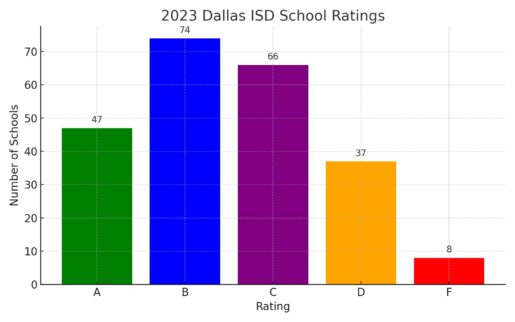After a lawsuit-induced delay, the Texas Education Agency (TEA) has released its long-awaited 2023 A–F accountability ratings, restoring public visibility into school performance across the state for the first time in two years.
The data shows that 45 schools in Dallas ISD—roughly one in five—received D or F ratings, and 100% of those campuses are located in high—or moderate-poverty areas.
According to the newly published scores:
-
37 Dallas ISD campuses were rated D
-
8 campuses received an F
-
None of the failing
-
Or near-failing schools were in low-poverty areas

This stark performance divide highlights persistent disparities in student outcomes tied to economic disadvantage despite years of district reform efforts.
“In light of the recent TEA Accountability ratings, it remains evident that we still have work to do to solve the challenges within our education systems,” said Nakia Douglas, executive director of the Dallas Education Collective. “While some schools were able to continue their ability to effectively educate their students, the vast majority of the struggling and/or failing schools remain within the communities with the greatest needs.
“The Dallas Education Collective is actively researching, discussing, and designing educational solutions for the kids, families, and communities that need us most.”
The 2023 accountability ratings, based on the 2022–23 school year, were released on April 24, 2025, after being blocked by litigation challenging TEA’s updated scoring system.
TEA Commissioner Mike Morath said the legal delays hurt transparency and denied families essential information. “Every Texas family deserves a clear view of school performance, and now those families finally have access to data they should have received two years ago,” Morath said. “Transparency drives progress, and when that transparency is blocked, students pay the price.
The A–F ratings assess campuses based on student achievement, school progress, and closing the gaps—metrics designed to spotlight both excellence and areas in need of intervention. This latest release also includes “What If” scores for 2022, applying the updated methodology retroactively for comparison purposes.
While 47 Dallas ISD schools received A ratings and 74 received Bs, advocates say the high concentration of underperforming schools in economically disadvantaged neighborhoods is unacceptable and requires urgent attention.
The Texas Legislature established the accountability system in 2017 through House Bill 22, intending to ensure that all students—regardless of background—have access to a high-quality education. Yet, the current ratings show that many students in Dallas ISD remain stuck in struggling schools with limited options.
As school leaders and policymakers prepare for the 2024–25 school year, which is expected to return to regular rating cycles, many are calling for bold reforms that go beyond temporary interventions and address the root causes of chronic underperformance.


